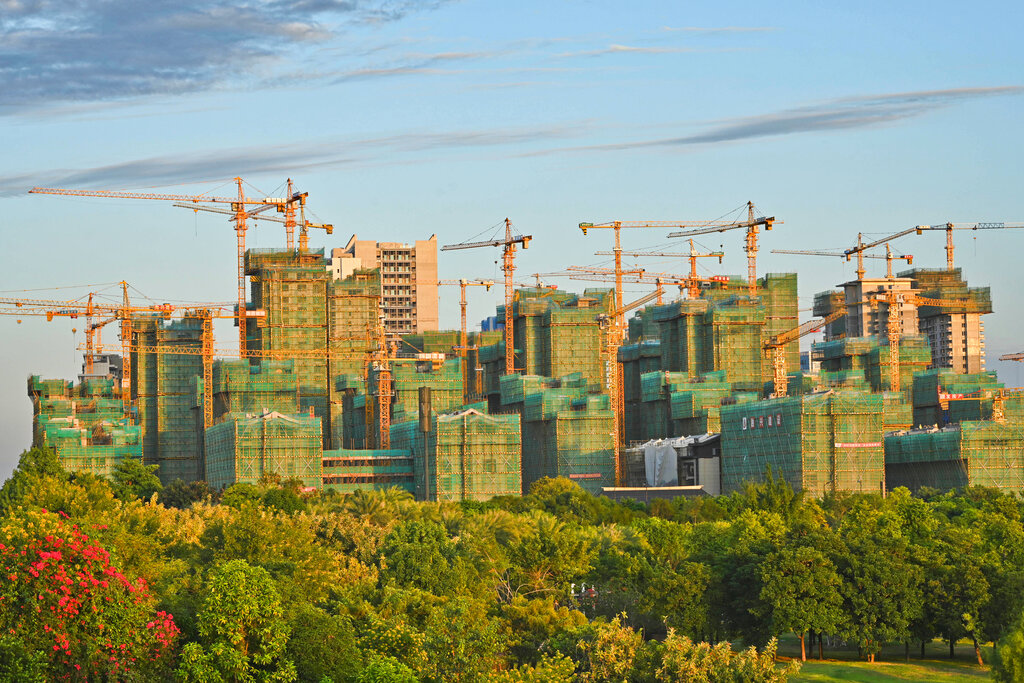
China's debt-laden property sector is facing yet another crisis, as homebuyers on the mainland have started to withhold mortgage payments on hundreds of unfinished housing projects. Hang Seng China H-Financials Index dipped more than 10% in July, and the property stock gauge also saw a similar decline.
Iris Tan, senior equity analyst at Morningstar, attributes the slump to the market’s fears that the move could spread nationwide and kill the nascent recovery of the property market, triggering financial systemic risks.
"However, we believe it is still too early to jump to such conclusions given the limited scale of the potential mortgage defaults relative to Chinese banks’ CNY 38 trillion home mortgage loan book. The possibility of actual default is low in our view," she adds.
Which Developers and Provinces Are Most Affected?
Investors’ biggest fear has been that a mass default on mortgages will lead to a banking system collapse. More than 100 real estate projects across 19 provinces and municipalities are reportedly exposed to mortgage defaults. Affected projects are mainly situated in central China, specifically in the Henan, Hubei, and Hunan provinces.
China Evergrande Group (03333) is the most affected with 34 projects facing defaults, while other developers generally have fewer than four affected projects. Most of the affected developers had run into liquidity difficulties in the past 12 months. Other than Evergrande Group, examples are Sunac China (01918), China Aoyuan (03883), Kaisa Group (01638), and Shimao Group (00813).
Mortgage delinquency – if spread to more home projects in a wider geographical area – could amplify the already-negative homebuying sentiment, as well as appetite for developers’ stocks and bonds.
This will be another blow to the ailing and indebted sector. Fund managers believe improvements in home sales are one of the conditions keeping developers afloat as proceeds from unit sales would roll cash back into developers’ books to meet the outstanding interests and bond liabilities.
How Big Is Banks’ Exposure to Mortgages?
According to Tan, as the news of the mortgage boycott broke, Chinese banks reacted promptly to check outstanding loans involved in the issue.
Of the 16 major commercial banks that released notices, Agricultural Bank of China (01288) and Industrial and Commercial Bank of China (01398) posted the highest amount exposure at over RMB 600 million, while China Merchants Bank (03968) posted the lowest amount of RMB 12 million.
If we put those figures into perspective, mortgages lent to buyers of potentially delayed projects amounts to as much as 3% of China’s home mortgage loan book for the largest 14 banks. Even in a bearish scenario where the government fails to step in and ensure home delivery to buyers, at worst, banks will endure a 2.4% hit on their profits.
"We believe the mortgage issues will be small in scale and not post significant threats to the financial system, as the root cause of this problem is not a sharp deterioration in households’ balance sheets, but fear over developers’ liquidity," says Tan, who adds that China’s banking system has a strong risk management mechanism that makes it able to withstand losses.
Within the sector, greater pain will be felt by small and micro banks, which tend to have concentrated mortgage portfolios and weaker risk management systems.
Are There Any Other Consequences?
While Tan expects the imminent impact on banks’ credit quality to be small, the mortgage boycott reveals multiple challenges facing privately-owned developers, such as tight liquidity conditions and weak consumer confidence.
A direct and immediate impact on banks may be capped. However, "investor sentiment for banks is extremely low, driven by separate events, including the Henan village bank incidents, trust product disputes, and mortgage issues, but we believe the media has overhyped risks in China’s financial system and the possibility of a financial crisis." she says.
While Tan retains her fair value estimates for most of the covered banking names, she has adjusted her estimates downward for two banks both heavily exposed to retail clients. China Merchants Bank is trimmed to HK$ 68 from HK$ 70; Ping An Bank to RMB 24 from RMB 26.
As the event unfolds, the recovery pace in the property sector may be disturbed and become slower than expected. The country’s Covid-zero mindset also adds to the challenges.
A clear and strong signal will be needed from policymakers, says Tan. "The government will have to show its willingness to serve as the 'rescuer of last resort' to ensure the completion of presold property construction, and offer guarantees on high-quality developers, and demand stimulus to restore market confidence."
Which China Banks Should You Buy Right Now?
From a broader angle, Tan retains her previous view for net profit growth for Chinese banks to bottom out in the second quarter as pandemic-related pressures abate. It is also given that it requires time for more intensified policy support to take effect.
Amid a fragile economic outlook, analysts expect the government to buffer the banking sector by encouraging targeted credit flows "to put a floor under the economy". This move should benefit state-owned banks with the right customer base and inherent advantages in serving those strategic sectors.
In the sector, China Construction Bank (00939) and Agricultural Bank of China are two preferred picks. Both stand out with attributes like defensive earnings, attractive dividend yields, high geographical diversity in mortgage loans, and relatively low exposures to the sales of wealth management products with underlying assets linked to the property sector.































